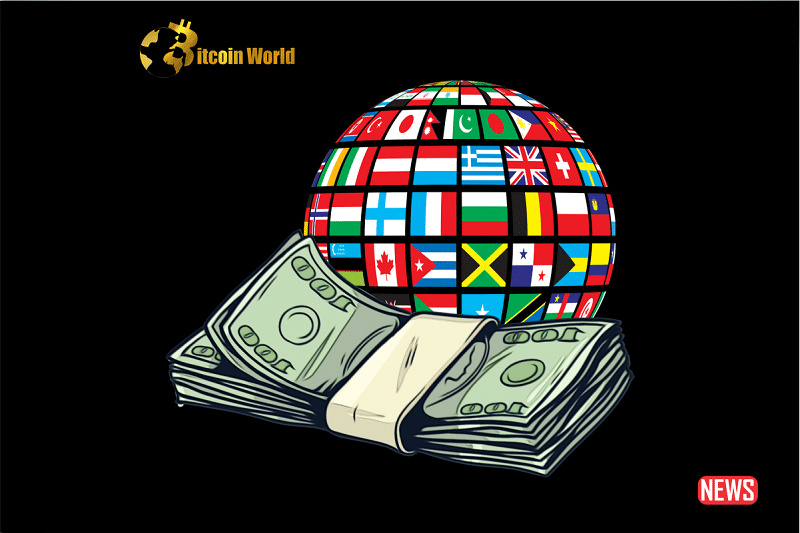The global financial landscape is constantly shifting, and whispers of a challenge to the US dollar’s dominance are growing louder. Could a new currency, backed by the BRICS nations (Brazil, Russia, India, China, and South Africa), actually shake the dollar’s long-held position in international trade? According to former White House economist Joseph Sullivan, it’s a possibility we can’t ignore.
What Exactly is This ‘Bric’ and Why Should We Care?
In a recent analysis published in Foreign Policy, Sullivan proposes that a BRICS-issued currency, tentatively dubbed the “bric,” could allow these economic powerhouses to bypass the US dollar in their trade transactions. Imagine Brazil selling goods to China, or Russia providing services to India, all without a single dollar changing hands. This isn’t just theoretical; Sullivan argues it’s a tangible possibility with significant implications.
Think of it this way: the US dollar has been the undisputed king of international commerce for decades. Most global trade, from oil to electronics, is priced and settled in dollars. This gives the US significant economic leverage. But what happens when a group of influential nations decides they want a different system?
Why Now? The Forces Behind a Potential Shift
Several factors are converging to make the idea of a BRICS currency more than just wishful thinking:
- Economic Clout: The BRICS nations are economic giants in their respective regions. Their combined economic output and trading power are substantial.
- Trade Surplus: As Sullivan points out, the BRICS collectively held a significant trade surplus of $387 billion in 2022, largely driven by China. This means they have the economic capacity to support trade among themselves.
- Desire for Independence: There’s a growing sentiment among some nations to reduce their reliance on the US dollar, partly fueled by concerns about US economic policy and the use of sanctions.
- Weaponization of the Dollar: The sanctions imposed on Russia have highlighted the potential risks of relying heavily on a currency controlled by another nation. Sullivan believes this “weaponization” of the dollar might actually accelerate the search for alternatives.
Can the ‘Bric’ Really Dethrone the Dollar?
Sullivan believes it’s a realistic possibility. He suggests the “bric” could indeed “steal the dollar’s place on the throne.” Why is he so confident?
Consider this:
- Self-Sufficiency in Trade: The BRICS nations have the potential for a high degree of trade self-sufficiency. They can largely meet their import needs from within the bloc.
- Reduced Vulnerability to US Policy: A BRICS currency would shield member nations from the direct impact of US monetary policy and sanctions.
A Concrete Example: Imagine Brazil wants to buy manufactured goods from China. Instead of converting Brazilian Real to US Dollars and then to Chinese Yuan, they could directly settle the transaction using the “bric.” This simplifies the process and eliminates exchange rate risks associated with the dollar.
What are the Hurdles? It’s Not All Smooth Sailing
While the potential is there, establishing and maintaining a successful BRICS currency won’t be easy. Here are some key challenges:
- Economic Divergence: The BRICS nations have diverse economies and varying levels of economic development. Aligning their economic policies and managing exchange rates could be complex.
- Trust and Stability: Building trust and ensuring the stability of a new currency requires significant cooperation and commitment from all member nations.
- Global Acceptance: For the “bric” to truly challenge the dollar, it needs broader acceptance beyond the BRICS bloc. This requires building confidence among other trading partners.
Will the Dollar’s Reign End Overnight?
Sullivan doesn’t think so. He emphasizes that “the dollar’s reign is unlikely to end overnight.” However, he argues that the introduction of a “bric” would begin to gradually erode the dollar’s dominance. Think of it as a slow but steady shift in the global financial landscape.
What Does This Mean for the Future of Global Trade?
The emergence of a viable alternative to the US dollar could lead to a more multipolar global financial system. This could have several implications:
- Reduced US Influence: The US might see a gradual decrease in its economic leverage and influence over global trade.
- Increased Trade Among BRICS Nations: A dedicated currency could facilitate and boost trade within the BRICS bloc.
- Potential for Regional Currency Blocs: The success of a BRICS currency could inspire other regional groupings to explore similar initiatives.
- Greater Currency Competition: More competition among currencies could lead to innovation and potentially lower transaction costs for international trade.
Key Takeaways: What You Need to Know
- Former White House economist Joseph Sullivan believes a BRICS-issued currency, the “bric,” could challenge the US dollar’s dominance.
- The “bric” would allow BRICS nations to trade goods and services without relying on the dollar.
- The BRICS’ significant trade surplus and desire for economic independence are driving forces behind this potential shift.
- While challenges exist, the “bric” could gradually erode the dollar’s supremacy, leading to a more multipolar financial world.
Looking Ahead: A Gradual but Significant Shift
The idea of a BRICS currency challenging the US dollar might seem like a distant prospect, but the underlying economic and geopolitical forces are real. While the dollar isn’t likely to lose its top spot overnight, the emergence of alternatives like the “bric” could signal a gradual but significant shift in the global financial order. It’s a development worth watching closely, as it could reshape the landscape of international commerce for years to come.
Disclaimer: The information provided is not trading advice, Bitcoinworld.co.in holds no liability for any investments made based on the information provided on this page. We strongly recommend independent research and/or consultation with a qualified professional before making any investment decisions.




